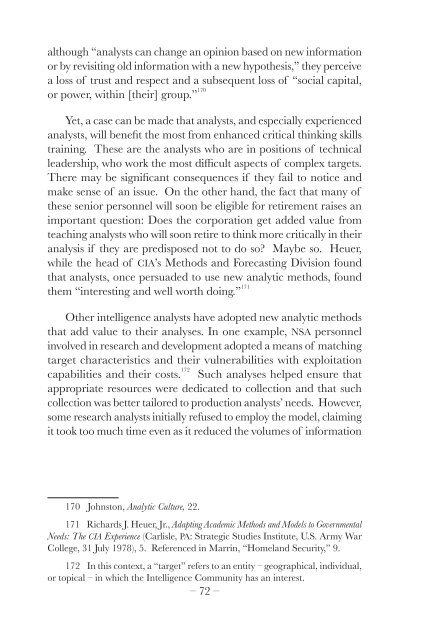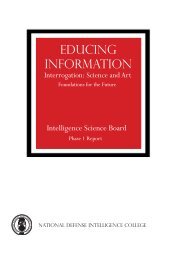Critical Thinking and Intelligence Analysis
Critical Thinking and Intelligence Analysis
Critical Thinking and Intelligence Analysis
You also want an ePaper? Increase the reach of your titles
YUMPU automatically turns print PDFs into web optimized ePapers that Google loves.
although “analysts can change an opinion based on new information<br />
or by revisiting old information with a new hypothesis,” they perceive<br />
a loss of trust <strong>and</strong> respect <strong>and</strong> a subsequent loss of “social capital,<br />
or power, within [their] group.” 170<br />
Yet, a case can be made that analysts, <strong>and</strong> especially experienced<br />
analysts, will benefit the most from enhanced critical thinking skills<br />
training. These are the analysts who are in positions of technical<br />
leadership, who work the most difficult aspects of complex targets.<br />
There may be significant consequences if they fail to notice <strong>and</strong><br />
make sense of an issue. On the other h<strong>and</strong>, the fact that many of<br />
these senior personnel will soon be eligible for retirement raises an<br />
important question: Does the corporation get added value from<br />
teaching analysts who will soon retire to think more critically in their<br />
analysis if they are predisposed not to do so Maybe so. Heuer,<br />
while the head of CIA’s Methods <strong>and</strong> Forecasting Division found<br />
that analysts, once persuaded to use new analytic methods, found<br />
them “interesting <strong>and</strong> well worth doing.” 171<br />
Other intelligence analysts have adopted new analytic methods<br />
that add value to their analyses. In one example, NSA personnel<br />
involved in research <strong>and</strong> development adopted a means of matching<br />
target characteristics <strong>and</strong> their vulnerabilities with exploitation<br />
capabilities <strong>and</strong> their costs. 172<br />
Such analyses helped ensure that<br />
appropriate resources were dedicated to collection <strong>and</strong> that such<br />
collection was better tailored to production analysts’ needs. However,<br />
some research analysts initially refused to employ the model, claiming<br />
it took too much time even as it reduced the volumes of information<br />
170 Johnston, Analytic Culture, 22.<br />
171 Richards J. Heuer, Jr., Adapting Academic Methods <strong>and</strong> Models to Governmental<br />
Needs: The CIA Experience (Carlisle, PA: Strategic Studies Institute, U.S. Army War<br />
College, 31 July 1978), 5. Referenced in Marrin, “Homel<strong>and</strong> Security,” 9.<br />
172 In this context, a “target” refers to an entity – geographical, individual,<br />
or topical – in which the <strong>Intelligence</strong> Community has an interest.<br />
– 72 –
















